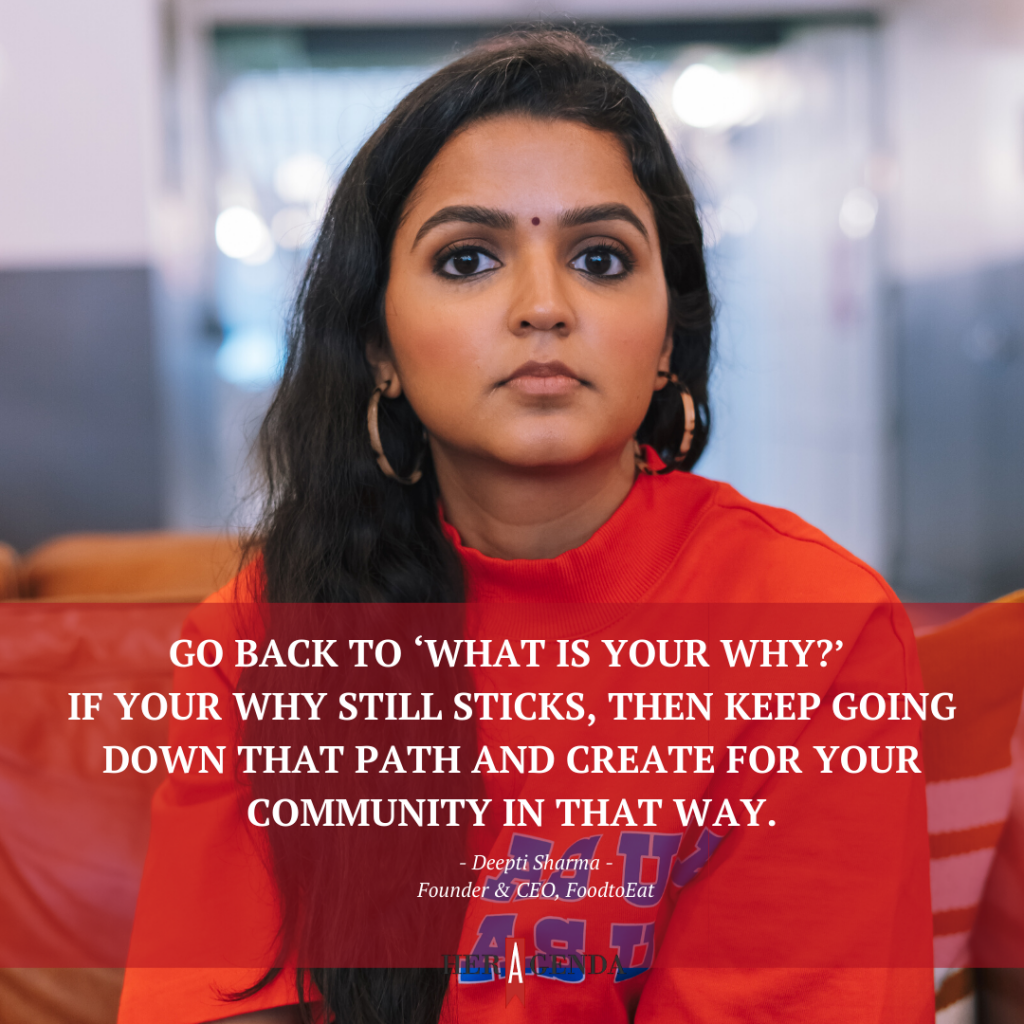As a first-generation Indian-American, Deepti Sharma always valued her immigrant roots. In fact, she credits those roots as one of the reasons she has become who she is now — an entrepreneur who uses her business to champion immigrant and women minority-owned businesses in the restaurant industry. As the Founder and CEO of FoodtoEat, Sharma’s services create opportunities for immigrant and women minority-owned restaurants to book large catering gigs with some of New York’s largest corporate offices including Microsoft, LinkedIn, Chegg, Warby Parker and more.
However, as the COVID-19 global pandemic forced corporate offices to run remotely, FoodtoEat’s revenue immediately hit rock bottom. But Sharma, like many other small business owners, has found a way to continue using her business to serve an underrepresented community.
She sat down with Her Agenda to talk more about her entrepreneurship journey, the work she’s done to humanize, and acknowledge immigrant and women minority owners of the restaurant industry, along with the new business model she’s adapted to stay afloat during the pandemic.
Her Agenda: How did you get started in entrepreneurship?
Deepti Sharma: I started my company FoodtoEat in 2011. I was standing on line at a food truck. I waited for 30 minutes and all I got was a cookie. For me at that time, it was ‘How do we create more access to food trucks and carts?’ It was that one experience of waiting too long in line [that led me on a path to] figuring out a better way to be able to create access.
I started talking to a lot of the food truck and car owners and noticed that a lot of them were immigrant and women minority-owned restaurants who really don’t have tech companies advocating for them. FoodtoEat came from wanting to be able to create for immigrants, women, and minority-owned businesses — essentially under-represented communities that are in the food world.
Her Agenda: Why was it important for you to connect immigrant, women, and minority-owned food vendors?
Deepti Sharma: One, it’s who I am. I’m a first-generation American. I was born here but my parents are from India. As most immigrant families, they came here for a better opportunity. What I noticed was every tech company that was being built was not being built with restaurants in mind or any of these communities in mind. They were being built for the convenience culture at the time.
-What I noticed was every tech company that was being built was not being built with restaurants in mind or any of these communities in mind. They were being built for the convenience culture at the time.
They were thinking ‘How can I make it easier for a customer to order food from their home?’ as opposed to ‘How can I make it easier for a restaurant to market their business or gain more business?’ The latter was the angle that I wanted to approach it with. How do I make it easier for a food truck to be able to accept orders from a consumer? Or how do I make it easier for a restaurant to not have to pay really high fees in order to get the same access?
It was really important for us to shift that mentality. How do we help them? Because it’s who I am, it speaks to my background and I wanted to create for them.
Her Agenda: What have you learned about being a small business owner during the wake of COVID -19? What all has really changed for you?
Deepti Sharma: FoodtoEat is a corporate concierge service where we partner with immigrant women minority-owned restaurants in New York City to help them book catering jobs at large corporate offices.

So that’s where we pivoted because the consumer space was getting crowded. But then COVID-19 came. And what we saw was people started working from home. And we depend on people having in-person meetings or working from their offices.
Warby Parker had 300 plus employees that were getting these meals from us. Now, they’re all at home. Essentially, we went to zero revenue immediately because nobody was working in their offices.
We decided to start a fundraiser. To date, we’ve raised over $50,000. We’re taking that money and purchasing meals from the restaurants that are open and then delivering food to people that are in need. We delivered to frontline workers at hospitals and nursing homes.
We’ve also been working with a domestic violence shelter called Womankind and we’re partnering with them to have meals donated to their shelters every week.

Her Agenda: What is some advice you have for other business owners trying to adapt during these circumstances?
Deepti Sharma: I’m thinking about how to continue to add value. So there’s a lot of people who have told us ‘Why don’t you go into consumer delivery?’ There are already companies that have been doing it. And if I now all of a sudden come into that space, I also need capital. I also need a lot more things I don’t have access to immediately. So, I just go back to my mission of wanting to provide more opportunities. Everyone needs to go back to ‘What is your why?’ If your why still sticks, then keep going down that path and create for your community in that way. Think about your why, but also talk to your community. What do they need? What are they suffering from? Whoever you sell to, whoever you create for — speaking with them is really important.

Her Agenda: Let’s talk about work and motherhood. What has been some of your biggest challenges as an entrepreneur while dealing with the demands of being a mother— especially during the pandemic?
Deepti Sharma: We have a four-year-old and a two-year-old. For me, it’s the constant guilt of not being there enough and feeling that I’m not paying attention. But at the same time, everything I’m doing whether it’s going out into the field and working with our restaurants and delivering meals, it is for them.
-Everything I’m doing whether it’s going out into the field and working with our restaurants and delivering meals, it is for them.
Everything I am doing is to show my children that the importance of community comes over anything else. Making sure that we don’t just survive as individuals but altogether is essential to me.
It’s Brown and Black women that will build for ourselves. So, as individuals if you feel that there is a void that needs to be filled, I think it’s best to build it yourself as opposed to waiting for someone else to build it and saying ‘Oh, I had that idea.’
Her Agenda: You’ve written about how motherhood could be modernized in the workplace. But the workplace has now changed for a lot of women who are working from home and mothering at the same time. What’s some advice you have for companies now— as many mothers are now working from home while trying to keep up with their kids?
Deepti Sharma: When companies think about how they can help working parents, I think it’s really essential for them to be as accommodating as they can be. Know that there are certain times where parents will not be able to work. This is just our reality right now and a lot of companies are talking about how they’ll continue working from home. Companies need to be thinking about ‘What are the parents’ needs?’ And it goes back to talking to them. Do they need help? Do they need hours that are different? Be accommodating and flexible, keep listening to the parents, and see what they need. And do check-ins.

Her Agenda: There are many women who have dreams of becoming an entrepreneur but may be feeling like it’s impossible due to the pandemic. What would you say to them?
Deepti Sharma: People shouldn’t allow this pandemic to kill their hopes and dreams. As a woman of color, I know that people aren’t generally looking out for us. Generally, people aren’t saying, ‘I’m going to build a business for Black and Brown women because I know they have it hard.’ It’s Brown and Black women that will build for ourselves. So, as individuals if you feel that there is a void that needs to be filled, I think it’s best to build it yourself as opposed to waiting for someone else to build it and saying ‘Oh, I had that idea.’

I always ask people ‘Why you and why now?’ If you can answer those questions for yourself those are the two most important questions to answer when you think about building a business. But there are risks. If you can’t afford to be an entrepreneur full time, do it as a side hustle until it could be your main hustle.
If you can’t afford to be an entrepreneur full time, do it as a side hustle until it could be your main hustle.
Her Agenda: What is your motto or the day to day quote that keeps you going?
Deepti Sharma: One is you can’t be what you can’t see. For me, there weren’t a lot of women that looked like me that were in higher up positions. It’s really important for me to live by that and to try to constantly be what I didn’t have when I was younger.
[Editor’s note: This interview has been edited for length and clarity.]









